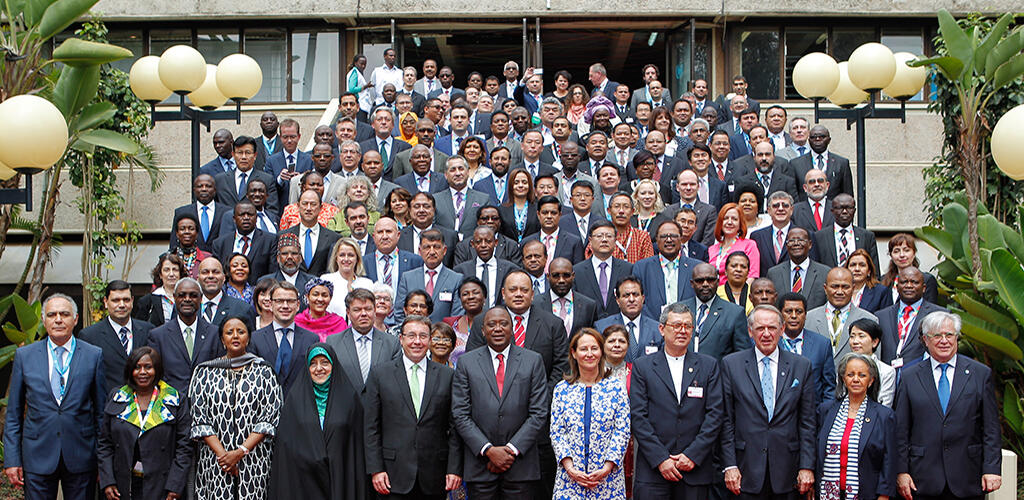Translated from Arabic by Zeina Nasser
“UNEP”’s reports, which were presented at the UN Environment Programme (UNEP)’s headquarters in Nairobi, focused on six “emerging” issues, which pose a threat to the environment and to human health. One of these issues is the alarming increase in zoonotic diseases in the whole world, although they are not classified as “emerging” issues. There are many types of zoonotic diseases, and they have been spreading widely around the world for many years. “Zika”, a new type of these diseases has emerged this year, after many renowned diseases in this regard, such as Ebola, swine flu, bird flu, SARS and H1N1 … and others.
The same goes for air pollution. New reports say that this type of pollution has increased by 8 percent between 2008 and 2013, and it began causing the larger amount of deaths in the world, according to the World Health Organization (WHO).
There are also alarming amounts of plastic wastes in the oceans (about 13 million tons of plastic particles in the oceans and seas). Production of plastics has increased in the world instead of declining (311 million metric tons in the year 2014), although complaints of the spread of plastic molecules in the oceans, seas, rivers, valleys and soil has begun long ago. The world did not succeed in finding the alternatives, or in imposing taxes, or banning its wide usage.
Other reports however, mention the impact of climate change on the toxicity of crops and food safety, and on the illegal trade in wildlife … These are not new topics, and their aggravation has been confirmed.
One of the reports reveals how droughts and high temperatures can lead to the accumulation of chemical compounds in crops, such as wheat, barley and maize (which are among the crops that are mostly vulnerable to the accumulation of nitrates), which poison animals.
Heavy rain that comes after a prolonged drought, can also lead to a dangerous build-up of another toxic compound called “hydrogen cyanide” or “prussic acid”. It destroys crops such as flax, corn (normal and thin), cherries, and apples. In addition to the problem of “aflatoxin”, which is one of the fungal toxins that can cause cancer and impede the growth of the fetus.
This is also a new problem in crops, especially maize, and it is expected to rise due to increased temperatures. The report also reveals how diseases are transmitted from animals to humans, and how they are closely associated with healthy ecosystems, where human activities encroach natural habitats, and facilitate the production of pathogens in wildlife basins, thus, spreading and transmitting diseases more easily between cattle and humans. Recent years have witnessed the emergence of many zoonotic diseases, and the direct costs and losses of these diseases amounted to several trillion dollars.
Plastic pollution
On the other hand, another report monitored the impact of the increasing quantities of small plastic particles in the oceans on various organisms and threatens their existence, as well as the risks posed by these plastic particles on human health, especially that they started appearing in water systems.
Humans all over the world are consuming contaminated sea food. Nylon molecules are “found in the stomachs of everything”, starting from zooplanktons to whales, based on the studies and tests that have been mentioned and invoked in the report.
The financial sector
Many reports and speeches by speakers in Nairobi highlighted what they call “the financial sector”, whose role is not limited only to strengthen “economic growth”, as they mention, but they find that it has a “crucial role in new Low Carbon Investments. They also see that it is efficient in using resources … “, and it can also help in the transfer of capital.
The report presents a number of financial initiatives that offer innovative solutions, which can contribute in making a sustainable change, including the “Sustainable Living Plan”. In this regard, they mention the name of a company that is devoted to reducing the environmental impact of greenhouse gas emissions produced in its plants by 50% in the year 2020.
Climate Change
Another report highlights two important issues related to climate change, which are mitigation and adaptation to climate change. Scientific evidence mentions that the losses and damages caused by climate change are inevitable, and are associated with serious consequences on ecosystems, people, and economic systems.












